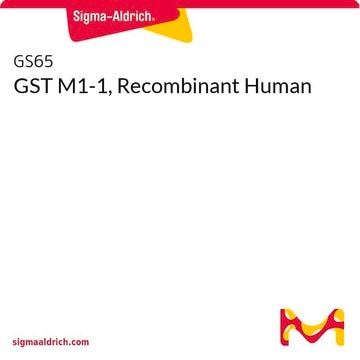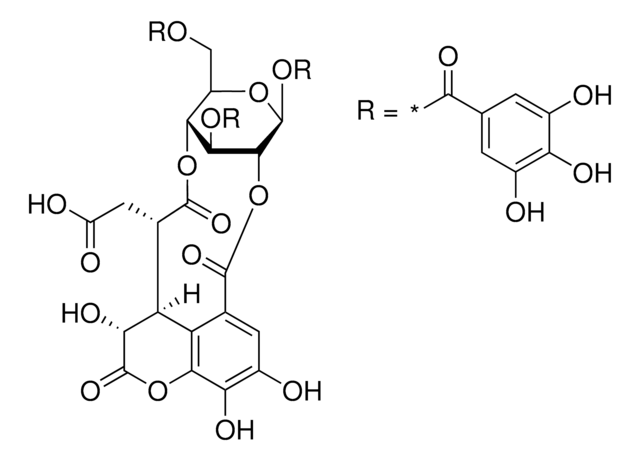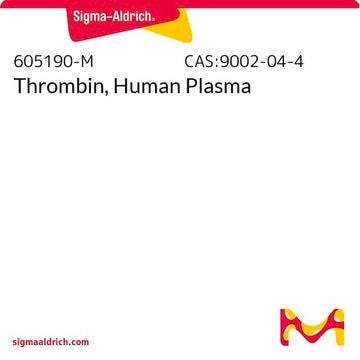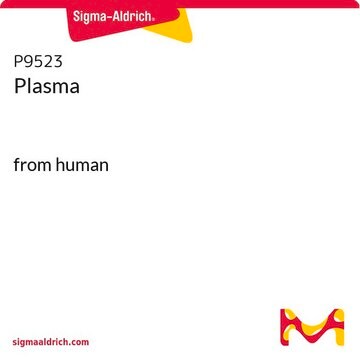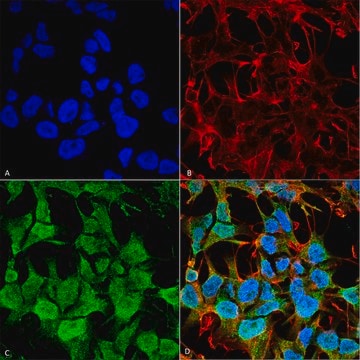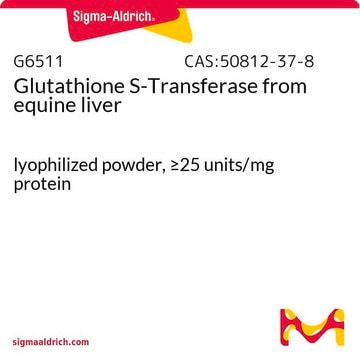GS60
GST A1-1, Recombinant Human
Sinónimos:
GST-epsilon, GST2, GSTA1-1, GTH1, glutathione S-transferase alpha 1
Iniciar sesiónpara Ver la Fijación de precios por contrato y de la organización
About This Item
UNSPSC Code:
12352200
NACRES:
NA.26
Productos recomendados
biological source
human
Quality Level
recombinant
expressed in E. coli
assay
>95% (SDS-PAGE)
form
frozen liquid
specific activity
21.04 units/mg protein
mol wt
23 kDa
concentration
2.0 mg/mL
storage temp.
−70°C
Gene Information
human ... GSTA1(2938)
General description
using spectrophotometric determination of 1-chloro-2,4-dinitrobenzene (CDNB) conjugation with reduced glutathione (1 mM) in 100 mM NaPO4 (pH 6.5) at room temperature.
Biochem/physiol Actions
Glutathione S-transferase alpha 1 (GSTA1) is an enzyme that in humans is encoded by the GSTA1 gene. Glutathione S-transferases (GSTs) are a family of enzymes that play an important role in detoxification by catalyzing the conjugation of many hydrophobic and electrophilic compounds with reduced glutathione. Based on their biochemical, immunologic, and structural properties, cytosolic and membrane-bound forms of glutathione S-transferase are encoded by two distinct supergene families. At present, eight distinct classes of the soluble cytoplasmic mammalian glutathione S-transferases have been identified: alpha, kappa, mu, omega, pi, sigma, theta and zeta. The GSTs are thought to function in xenobiotic metabolism and play a role in susceptibility to cancer, and other diseases.
The GSTA1 gene encodes a member of a family of enzymes that function to add glutathione to target electrophilic compounds, including carcinogens, therapeutic drugs, environmental toxins, and products of oxidative stress. This action is an important step in detoxification of these compounds. This subfamily of enzymes has a particular role in protecting cells from reactive oxygen species and the products of peroxidation. Polymorphisms in this gene influence the ability of individuals to metabolize different drugs. This gene is located in a cluster of similar genes and pseudogenes on chromosome 6. Alternative splicing results in multiple transcript variants.
Storage and Stability
The enzyme should be used by the end-user customer within 1 year of receipt.
Storage Class
10 - Combustible liquids
wgk_germany
WGK 1
flash_point_f
Not applicable
flash_point_c
Not applicable
Certificados de análisis (COA)
Busque Certificados de análisis (COA) introduciendo el número de lote del producto. Los números de lote se encuentran en la etiqueta del producto después de las palabras «Lot» o «Batch»
¿Ya tiene este producto?
Encuentre la documentación para los productos que ha comprado recientemente en la Biblioteca de documentos.
Los clientes también vieron
Hong-Na Wang et al.
Clinical immunology (Orlando, Fla.), 160(2), 342-348 (2015-07-30)
Pulsed low-dose cyclophosphamide (CTX) therapy has become a very effective approach in improving the clinical outcomes of lupus nephritis (LN) patients. However, variations of CTX therapeutic outcomes in LN patients are incompletely understood. We investigated the contributions of known allelic
Humaira Adnan et al.
PloS one, 7(12), e51739-e51739 (2012-12-20)
The colonic epithelium continuously regenerates with transitions through various cellular phases including proliferation, differentiation and cell death via apoptosis. Human colonic adenocarcinoma (Caco-2) cells in culture undergo spontaneous differentiation into mature enterocytes in association with progressive increases in expression of
Chen Zong et al.
Journal of assisted reproduction and genetics, 31(3), 379-382 (2014-01-07)
Recurrent spontaneous abortion (RSA) is a multifactor and distressing disease. There are still approximately half of the RSA patients with cause not being identified to date. Accumulating studies have confirmed that genetic polymorphisms in glutathione S-transferases (GSTs) were associated with
Xue-Diao Pan et al.
Asian Pacific journal of cancer prevention : APJCP, 15(20), 8631-8635 (2014-11-07)
Glutathione S-transferase A1 (GSTA1) appears to be primarily involved in detoxification processes, but possible roles in lung cancer remain unclear. The objective of this study was to investigate the expression and function of GSTA1 in lung cancer cells. Real-time PCR
Qiwen Deng et al.
Journal of B.U.ON. : official journal of the Balkan Union of Oncology, 20(1), 287-295 (2015-03-18)
Glutathione S-transferases (GSTs) are involved in the detoxification of carcinogens, and may be linked to carcinogenesis. As a vital component of GSTs, GSTA1 plays an important role in carcinogenesis. However, the studies about the effect of GSTA1 polymorphisms on cancer
Nuestro equipo de científicos tiene experiencia en todas las áreas de investigación: Ciencias de la vida, Ciencia de los materiales, Síntesis química, Cromatografía, Analítica y muchas otras.
Póngase en contacto con el Servicio técnico
